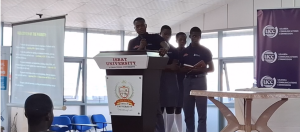SMARTCARE — Modern Hospital Management System

The Challenge: Transforming Uganda’s Healthcare Landscape
Uganda’s healthcare sector continues to grapple with deep-rooted inefficiencies that undermine the quality of patient care. Public hospitals often operate far beyond capacity, running at 120–150% occupancy, which strains both staff and infrastructure. Compounding this challenge is the persistent reliance on manual record-keeping systems, where one in every three patient files is either incomplete or misplaced.
These paper-based systems contribute to long queues, lost records, and delayed treatment, while also exposing sensitive health data to breaches and inaccuracies. The Ministry of Health (2023) reported that healthcare workers spend up to 30% of their time managing paperwork, time that could otherwise be devoted to direct patient care. This inefficiency also affects critical services such as oncology, where a 2024 survey revealed that 58% of patients received substandard care due to record loss or delayed access to test results.
In rural areas, the situation is even more dire. Many communities lack timely access to emergency services, and poor communication systems mean that patients often arrive too late for critical interventions. Against this backdrop, the ICT Club of St. Henry’s College Kitovu saw a clear opportunity to apply technology to one of Uganda’s most pressing public health challenges.
💡 The Inspiration Behind SMARTCARE
To address these persistent inefficiencies, the young innovators from St. Henry’s College Kitovu developed SMARTCARE — a modern, web-based hospital management system that integrates artificial intelligence, blockchain technology, and real-time communication tools to streamline healthcare administration.
SMARTCARE was first presented on 9th August 2025 during the ICT Clubs competitions, under the mentorship of KAWA Uganda and the guidance of the Uganda Communications Commission (UCC). The students designed the system to revolutionize how hospitals manage patient data, reduce administrative bottlenecks, and deliver faster, more accurate, and patient-centered care.
⚙️ How SMARTCARE Works
SMARTCARE is a comprehensive digital hospital management platform that replaces paper-based workflows with a unified, intelligent digital system. It enables hospitals and clinics to digitize patient records, manage appointments, track billing, and automate prescription and follow-up processes.
The platform’s core functions include:
- AI-Powered Predictions: Identifying potential health risks based on patient history.
- Blockchain Security: Protecting medical records from tampering and unauthorized access.
- Smart Scheduling: Reducing queues by automatically assigning and managing patient appointments.
- Telemedicine Integration: Enabling consultations with doctors remotely, especially for patients in rural areas.
- Emergency Alerts: Improving first-response coordination during medical crises.
By automating these processes, SMARTCARE minimizes human error, saves time, and improves hospital efficiency. The system promotes data accuracy and security while ensuring that every patient receives timely and reliable service.
🌟 Innovation for Real Impact
SMARTCARE is more than a digital tool — it is a vision for a modern, efficient, and compassionate healthcare system. It transforms the hospital experience by bridging the gap between doctors, patients, and administrators through smart data management and instant communication.
This innovation supports Sustainable Development Goal 3 — Good Health and Well-being, demonstrating how youth-led digital projects can align with Uganda’s national development goals. The system’s potential to enhance hospital administration, streamline operations, and improve medical record management positions it as a game-changer for Uganda’s healthcare transformation.
Beyond its immediate technical benefits, SMARTCARE also promotes e-health adoption and encourages hospitals to transition from outdated manual systems to smarter, more resilient digital infrastructures. The project shows that with creativity, research, and guidance, young innovators can contribute meaningfully to national progress.
🧠 Research, Tools, and Development
The team’s development journey combined technical research, community engagement, and field-based learning. Students utilized computers and internet resources to design and simulate the system, while obtaining research permissions to visit hospitals and study real-life challenges in patient record management and emergency handling.
Their findings shaped the architecture of SMARTCARE, ensuring it was not just a classroom concept but a real-world solution tailored to Uganda’s healthcare environment.
🤝 Mentorship and Acknowledgments
The project’s success is rooted in the UCC ICT Clubs Initiative, which empowers young innovators across Uganda to identify community challenges and develop digital solutions. Through KAWA Uganda’s mentorship, the students received technical guidance, research support, and exposure to digital innovation best practices.
The lead innovator, Turinawe Vianney, expressed gratitude for the opportunity to contribute to a better healthcare system, emphasizing that SMARTCARE is not merely a project but a commitment to leveraging ICT for public good.
📧 Contact: turinawevian@gmail.com
📞 Phone: 0776 451 423
🚀 Bridging Innovation, Education, and Development
The story of SMARTCARE illustrates how education and innovation can work hand in hand to solve real community problems. It reflects the broader mission of ICT Clubs Uganda, which continues to nurture a generation of digital thinkers capable of transforming their environment through creativity and problem-solving.
By integrating technology into sectors like healthcare and agriculture, schools such as St. Henry’s College Kitovu are proving that the power of ICT goes far beyond coding or software design — it lies in improving livelihoods, streamlining systems, and fostering development through collaboration.
With consistent mentorship, strategic partnerships, and supportive policies, innovations like SMARTCARE can grow from school prototypes into national health systems that define the next chapter of Uganda’s digital transformation.






